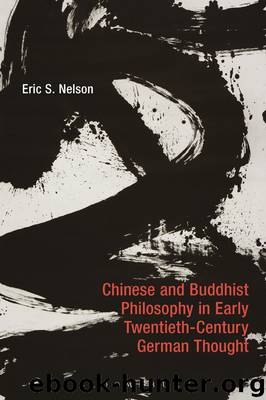Chinese and Buddhist Philosophy in Early Twentieth-Century German Thought by Eric S. Nelson

Author:Eric S. Nelson
Language: eng
Format: epub
Publisher: Bloomsbury UK
7
Encounter, Dialogue, and Learning: Martin Buber and Zen Buddhism
Introduction
This chapter examines the marginalization of Zen (禪, Ch. Chan; Jp. Zen) Buddhism in Western philosophy during the middle of the twentieth-century and elucidates how Martin Buber’s approach to Zen is partial yet significant and suggestive for a more appropriate intercultural hermeneutics and conception of philosophy. Buber’s recognition of the dialogical and ethical dimensions of Zen Buddhism diverge from stereotypical Western views of Zen awakening while requiring us to go further than Buber’s portrayal to arrive at a better understanding of Zen as exhibiting its own transformative dialogical ethos of encounter, dialogue, and learning.
Buber was trained in the discipline of philosophy, and his primary works are in the philosophy of language, philosophy of religion, and ethics. He wrote extensively on Judaism and comparative religion. Buber belongs to a select group of modern Western philosophers, including Leibniz and Misch, who argued for a hermeneutical openness toward non-European forms of thought. Leibniz, Misch, and Buber explicitly asserted that the West can and is indeed in need of learning from the East. There is neither a fundamental incomprehensible abyss between two monolithic realities with their own substantialized identities, an East and West that can never meet nor interact but only be anticipated (the Heideggerian model), nor the presupposition of the intrinsic Western preeminence in that which can be taught and learned (the Hegelian model). Leibniz (albeit in an earlier form), Misch, and Buber recognized and did not deny the uniqueness of the development of scientific rationality and technology in Western civilization; the achievements of Western reason did not lead them to leap to the conclusion that only the West has a fully developed rationality. This thesis is not limited to its most prominent proponents such as Hegel, Weber, and Husserl; it is also at work in twentieth-century Western critics, such as Arthur Koestler and Sidney Hook, who endeavored to exclude Zen Buddhism from Western culture and philosophy as a mere consumeristic fad or as a threatening nihilistic “Oriental” menace.
These features of Buber’s writings about East Asian philosophy and religion, the region that is the orienting focus of this work, are however insufficient on their own; more is required for an adequate intercultural hermeneutics than interpretive openness and readiness to communicate and learn. Still, Buber’s approach to interpretation, if not always his execution given the conditions of his understanding of East Asian sources and realities, is a gust of fresh air and an inspiration given the characteristic monotonous Eurocentrism of modern Western philosophy, which the present book has sought to contest in a historical way, and it points toward the prospect of a more adequate intercultural art of interpretation and thinking.
While it was Confucian China that could teach the West through an “exchange of light” (“car c’est un commerce delumière”) in Leibniz’s writings on China, it was the notion of “non-doing” (wuwei 無爲) in his early writings on Daoism and China that could reorient the West for Buber by indicating an alternative vision to the restless activism and consumption of modern technological civilization.
Download
This site does not store any files on its server. We only index and link to content provided by other sites. Please contact the content providers to delete copyright contents if any and email us, we'll remove relevant links or contents immediately.
The Way of Zen by Alan W. Watts(6578)
Ego Is the Enemy by Ryan Holiday(5393)
The Art of Happiness by The Dalai Lama(4116)
The Book of Joy by Dalai Lama(3961)
Why Buddhism is True by Robert Wright(3434)
Spark Joy by Marie Kondo(3284)
Shift into Freedom by Loch Kelly(3185)
Happiness by Matthieu Ricard(3031)
A Monk's Guide to a Clean House and Mind by Shoukei Matsumoto(2897)
The Lost Art of Good Conversation by Sakyong Mipham(2637)
The Meaning of the Library by unknow(2553)
The Unfettered Mind: Writings from a Zen Master to a Master Swordsman by Takuan Soho(2288)
The Third Eye by T. Lobsang Rampa(2250)
Anthology by T J(2195)
Red Shambhala by Andrei Znamenski(2177)
The Diamond Cutter by Geshe Michael Roach(2055)
Thoughts Without A Thinker: Psychotherapy from a Buddhist Perspective by Epstein Mark(2003)
Twilight of Idols and Anti-Christ by Friedrich Nietzsche(1884)
Advice Not Given by Mark Epstein(1871)
